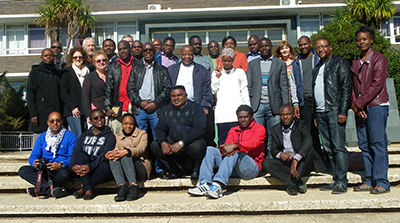Latest News Archive
Please select Category, Year, and then Month to display items
09 December 2020
|
Story UFS entral academic advising team
|
Photo Pixabay

It wasn’t easy, but we all got to this point because we stayed calm and made the effort to learn on even when it was difficult.
The University of the Free State (UFS) has remained committed to supporting you in every way possible, and as you prepare for the final assessments, remember to access the support tools you will need in order to successfully complete the 2020 academic year: https://www.ufs.ac.za/toolsforsuccess
Main exams are running from 30 November to 19 December 2020
All of the best, and break a pen in your upcoming final assessments. For those of you who will be graduating, we cannot wait to see you in that graduation attire; and those who still have some way to go, we cannot wait to serve you again in 2021 as we continue the pursuit of academic success!
Below are five main study tips that you can use for final assessment success:
1. Set a realistic study schedule
You might think that studying for eight hours straight for four days before the exam, will help you get through the work in time. See final edition of the #UFSLearnOn for more information.
2. Structure and organise your work
If your notes are organised, it is also easier for your brain to recall information, even when you become nervous during exams.
3. Practise with an old exam/semester test paper
Practice makes perfect, and although the final assessments might look different in how they are administered, it will still help to practise using old tests and exams.
4. Adapt your strategies to the content
What works for one module or even one learning outcome, might not be effective for another. You need to continually adapt your note-taking and study approaches. See #UFSLearnOn final edition for different study methods.
5. Healthy body, healthy mind
Your brain needs optimal care to perform at its best, and getting physically active (even if it is by jumping in one spot if space is limited) forces your body to release neurotransmitters responsible for positive emotions, which assist in retaining information in your memory …
Download the final edition of #UFSLearnOn that points you towards the resources you’ll need to ace your final assessments and end 2020 off on a high note!
First CAS Winter School brings researchers together
2016-08-01

International and University of the Free State delegates
during the three day Centre for Africa Studies
winter school.
Photo: Supplied
The first biennial doctoral Winter School by the Centre for Africa Studies at the University of the Free State (UFS) brought together UFS PhD researchers as well as current and new Africa Studies students specialising in the Conflict and Peace subfield.
According to Prof Heidi Hudson, Director of the Centre for Africa Studies, this was the aim of the Winter School, hosted in collaboration with the John and Elnora Ferguson Centre for African Studies (JEFCAS) in the Department of Peace Studies at the University of Bradford in the United Kingdom. The Winter School took place from 18-22 July 2016 on the UFS Bloemfontein Campus.
Doctoral students gain deeper insight during school
Prof Hudson said the Winter School was presented to share insights, and develop further understanding of the complex terrain of interdisciplinary studies.
“The School also provided an opportunity for the Centre’s newly-recruited doctoral students specialising in peace and conflict to gain deeper insight into Peace Studies methodologies,” said Prof Hudson.
Why male ex-combatants resort to violent behaviour?
To conclude the Winter School, Prof Donna Pankhurst from the University of Bradford presented a seminar. Her research paper, What is wrong with men? Revisiting violence against women in conflict and peacebuilding, tries to explain why men resort to violent behaviour after the end of combat duty. Prof Pankhurst described her research title as “a wacky title to grab people’s attention”. “This paper is part of a larger study which is exploring the extent to which post-traumatic stress disorder may impact on male ex-combatants' tendency to commit violence against women,” said Prof Pankhurst.